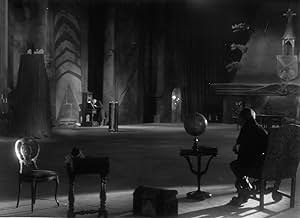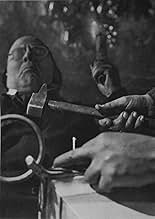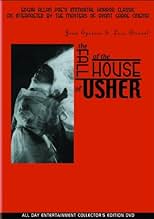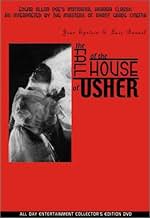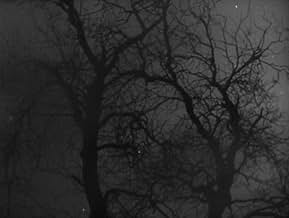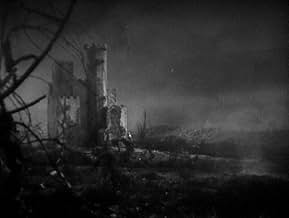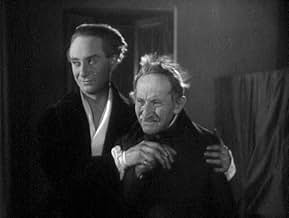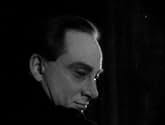IMDb रेटिंग
7.2/10
4.8 हज़ार
आपकी रेटिंग
अपनी भाषा में प्लॉट जोड़ेंAllan visits the sinister Usher family mansion, where his friend Roderick is painting a portrait of his sickly wife Madeline. The portrait seems to be draining the life out of Madeline, slow... सभी पढ़ेंAllan visits the sinister Usher family mansion, where his friend Roderick is painting a portrait of his sickly wife Madeline. The portrait seems to be draining the life out of Madeline, slowly leading to her death.Allan visits the sinister Usher family mansion, where his friend Roderick is painting a portrait of his sickly wife Madeline. The portrait seems to be draining the life out of Madeline, slowly leading to her death.
- निर्देशक
- लेखक
- स्टार
फ़ीचर्ड समीक्षाएं
The Fall of the House of Usher is about... well, I suppose it's about someone, Allan, visiting the house of Usher, run by Roderick, who lives with his sick wife Madeline and spends most of his time painting and trying to find a cure for whatever her supernatural-esquire disease is. The rest of what happens I cannot really say. Maybe because I'm still not totally sure myself. While I've yet to read the original Poe story, or see the later, more well known Roger Corman production with Vincent Price, I would probably advise on what little I know in comparing both films for the 1960 version if you're most concerned about sticking straight to the story.
Apparently, by the way, Luis Bunuel, who was director Jean Epstein's chief collaborator, quit after creative clashes over this issue. For whatever reason it was, I'd be hard-pressed to figure on how much influence he did or didn't leave on the picture. As it stands, and probably sticking to a certain aesthetic that was familiar for those in love with Poe, the silent version of Fall of the House of Usher is chock full of atmosphere in every kind of delicious, creepy, wonderful kind of connotation. The production design is sometimes full of a smoke, or a smoke-filled tint from the camera, and the outside of the mansion is covered in dirty fields and dead trees. The inside of the house, the interiors of the walls, the mirrors, the paints of Roderick's, and the placement of the camera in some strange angles (i.e. guitar) all build up to something unexpected.
Would I call it surrealism just because of Bunuel's involvement? Yes and no. Yes in that, of course, there are some striking moments that could only come out of a dream &/or a desire to just completely tool around with the audience's head just for the hell of it. And no because it's really Epstein's movie through it all, and he crafts this mostly as a somber, quietly intense picture where he experiments not in as a surrealist but as a director of contemplative Gothic horror. I can't even totally understand what absorbed me, but everything in the 'plastic', technical sense of the word did, not to mention the performances by Debucourt, Lamy, and especially Gance who all seem to be drifting in and out of the fantastical consciousness that seems to be living in this place, where life and death merge or go un-hinged, and (as another reviewer noted) is like a slow-poisoning prison.
Just, as I said, don't watch it to be wrapped up in 'what happens next in the "plot"', as it's more about what may happen in the next twist with a setting or a mood, or if a character should suddenly have a look that changes everything. It's not the greatest of the near-end silent period, but it's close.
Apparently, by the way, Luis Bunuel, who was director Jean Epstein's chief collaborator, quit after creative clashes over this issue. For whatever reason it was, I'd be hard-pressed to figure on how much influence he did or didn't leave on the picture. As it stands, and probably sticking to a certain aesthetic that was familiar for those in love with Poe, the silent version of Fall of the House of Usher is chock full of atmosphere in every kind of delicious, creepy, wonderful kind of connotation. The production design is sometimes full of a smoke, or a smoke-filled tint from the camera, and the outside of the mansion is covered in dirty fields and dead trees. The inside of the house, the interiors of the walls, the mirrors, the paints of Roderick's, and the placement of the camera in some strange angles (i.e. guitar) all build up to something unexpected.
Would I call it surrealism just because of Bunuel's involvement? Yes and no. Yes in that, of course, there are some striking moments that could only come out of a dream &/or a desire to just completely tool around with the audience's head just for the hell of it. And no because it's really Epstein's movie through it all, and he crafts this mostly as a somber, quietly intense picture where he experiments not in as a surrealist but as a director of contemplative Gothic horror. I can't even totally understand what absorbed me, but everything in the 'plastic', technical sense of the word did, not to mention the performances by Debucourt, Lamy, and especially Gance who all seem to be drifting in and out of the fantastical consciousness that seems to be living in this place, where life and death merge or go un-hinged, and (as another reviewer noted) is like a slow-poisoning prison.
Just, as I said, don't watch it to be wrapped up in 'what happens next in the "plot"', as it's more about what may happen in the next twist with a setting or a mood, or if a character should suddenly have a look that changes everything. It's not the greatest of the near-end silent period, but it's close.
Predictably morbid and grim, this early cinematic tribute to Poe offers some interesting images and beautifully haunting music. I liked the sequence showing the lace-draped coffin, as it was carried out of that cavernous room.
More stylistic than substantive, the overall effect of the film is to engender a sense of suffocating gloom, rather than to tell an interesting story. It's very much like what one would expect in a nightmare. Space seems strung-out. People are not quite real. Pacing is so slow as to render time suspended between two swings of the clock pendulum.
I don't recall a film that conveyed such an overwhelming sense of introverted bleakness, oppression, and ubiquitous death. Even the trees were dead.
A lot of viewers will find this film lifeless ... so to speak. But for those interested in the antiquity of the occult, or Poe in particular, this film will excite like no other.
More stylistic than substantive, the overall effect of the film is to engender a sense of suffocating gloom, rather than to tell an interesting story. It's very much like what one would expect in a nightmare. Space seems strung-out. People are not quite real. Pacing is so slow as to render time suspended between two swings of the clock pendulum.
I don't recall a film that conveyed such an overwhelming sense of introverted bleakness, oppression, and ubiquitous death. Even the trees were dead.
A lot of viewers will find this film lifeless ... so to speak. But for those interested in the antiquity of the occult, or Poe in particular, this film will excite like no other.
First and foremost: I love the tale of "House of Usher", regardless of which film version, and I try to encourage as many people as humanly possible to check out this haunting story of agony and Gothic damnation
So, I swear, if one more person replies me with: "Usher?
Oh, you mean the R&B singer? Yeah, he's cool", then I swear I will go Edgar Allan Poe on his/her ass! Thank you.
Admittedly I'm not much of an art connoisseur, but I reckon this silent classic is pure and genuine art! It's a stunningly beautiful, haunting, surreal and absorbing impressionistic interpretation of Poe's short story. The plot is undeniably subsequent to the atmosphere and choreography, and I actually don't recognize the storyline from the other versions I've seen. In the other versions, for example the awesome Roger Corman production starring the almighty Vincent Price, the Usher kinship is cursed and continuously being punished for the crimes committed by their evil ancestors. Here, it's actually just Sir Roderick Usher who's obsessed with painting a portrait of his lovely wife Madeleine, only The nearer the painting comes to completion, the more his wife weakens due to a strange illness. After her death and burial service, Sir Roderick becomes increasingly mad with the restless ghost of his Madeleine still prowling through the house. The story is often confusion and open for various interpretations, but the wholesome is just downright visually stunning! Director Jean Epstein, with the more than noticeable influence of his young and upcoming assistant director Louis Buñuel, generates an atmosphere that is morbid, depressing and hypnotic from start to finish and multiple sequences are hauntingly surreal; like the funeral march and the storm. I watched the 1997 restored version, during a special film festival where there was a professional pianist providing live musical guidance, and it was one of the most culturally engaged moments of my life. Art like this will surely survive for yet another hundred years.
Admittedly I'm not much of an art connoisseur, but I reckon this silent classic is pure and genuine art! It's a stunningly beautiful, haunting, surreal and absorbing impressionistic interpretation of Poe's short story. The plot is undeniably subsequent to the atmosphere and choreography, and I actually don't recognize the storyline from the other versions I've seen. In the other versions, for example the awesome Roger Corman production starring the almighty Vincent Price, the Usher kinship is cursed and continuously being punished for the crimes committed by their evil ancestors. Here, it's actually just Sir Roderick Usher who's obsessed with painting a portrait of his lovely wife Madeleine, only The nearer the painting comes to completion, the more his wife weakens due to a strange illness. After her death and burial service, Sir Roderick becomes increasingly mad with the restless ghost of his Madeleine still prowling through the house. The story is often confusion and open for various interpretations, but the wholesome is just downright visually stunning! Director Jean Epstein, with the more than noticeable influence of his young and upcoming assistant director Louis Buñuel, generates an atmosphere that is morbid, depressing and hypnotic from start to finish and multiple sequences are hauntingly surreal; like the funeral march and the storm. I watched the 1997 restored version, during a special film festival where there was a professional pianist providing live musical guidance, and it was one of the most culturally engaged moments of my life. Art like this will surely survive for yet another hundred years.
I had the chance to see this film about 20 years ago and it's still quite fresh in my mind (if you knew me you'd find this very unusual). I still remember how I was wrapping myself up during the course of the film as I was feeling colder and colder - it was a summer night, mind you.
The plot sticks tightly to the original story and it shows France's affinity with Edgar Allan Poe since it was the great Charles Beaudelaire himself who translated Poe's work into French.
The film manages to create an unusual sense of discomfort unlike most classic horror films where the settings etc. result more in a feeling of (uneasy) cosiness. The insanity in Roderick Usher's face is utterly believable as well as the parts of the other characters. What tops it all up is the constant draught in the mansion. Wall hangings are steadily moving and bits of paper and dust are blowing through the corridors. Hence the above mentioned feeling of physical coldness.
All I can say is I need to see this film again and I would be grateful if anyone could point me in the right direction (Quelq'un en France, peut-etre?).
The plot sticks tightly to the original story and it shows France's affinity with Edgar Allan Poe since it was the great Charles Beaudelaire himself who translated Poe's work into French.
The film manages to create an unusual sense of discomfort unlike most classic horror films where the settings etc. result more in a feeling of (uneasy) cosiness. The insanity in Roderick Usher's face is utterly believable as well as the parts of the other characters. What tops it all up is the constant draught in the mansion. Wall hangings are steadily moving and bits of paper and dust are blowing through the corridors. Hence the above mentioned feeling of physical coldness.
All I can say is I need to see this film again and I would be grateful if anyone could point me in the right direction (Quelq'un en France, peut-etre?).
I had always wanted to check out this Silent version of the Edgar Allan Poe horror perennial, and not just because of Luis Bunuel's involvement; actually, he only served as Second Assistant in charge of interiors on the film – so much for the co-directing credit that is often attributed to him (including the DVD front cover). Ironically, when the disc was released by All Day Entertainment, I recall complaining about its "Collector's Edition" moniker when it was a bare-bones affair apart from an essay by the director himself – the company's President David Kalat, however, was prompt to inform me that the proposed Bunuel-related supplements fell through at the last minute.
Anyway, this is now my third viewing of the movie: the second had occurred either as part of an earlier Bunuel retrospective or to compare it with one of the many other filmic renditions of the tale. For the record, a viewing of the obscure low-budgeted 1949 British effort followed this re-acquaintance with the Epstein film, while I also own and have watched the U.S. short (also from 1928) and the 1960 Roger Corman/Vincent Price classic but there are at least five more versions I would be interested in catching (by such notable directors as Alexandre Astruc, Jan Svankmajer, Jesus Franco, Curtis Harrington and Ken Russell)!
That said, my reaction to the film under review continues to be ambivalent: to begin with, this is perhaps one of only two cases which can truly be described as a dream-like experience (the other being the equally haunting but more readily satisfying VAMPYR [1932] by one of my favorite auteurs, Carl Theodor Dreyer); however, the sluggish pacing makes its brief 66 minutes feel long not helped by the archaic parts of the accompanying score (at least, some of it was suitably avant-gardist) and the droning narration, reading the English translation of the original French intertitles, by respected but heavily-accented actor Jean-Pierre Aumont!
Visually, the film really cannot be faulted as the Impressionist first half (with images that could almost be taken for paintings) giving way unsurprisingly to Expressionism in the much-anticipated high-strung finale. Even more than in MAUPRAT (1926), Epstein virtually lets the camera and the editing tell the story: the acting actually leaves much to be desired (especially since both Usher and his guest are way overage, with the latter bafflingly also made out to be quite deaf!); as for Madeleine, she is played by Marguerite Gance (wife of famous pioneer film-maker Abel – Bunuel's disdain of whom eventually cost him his job!), who manages the character's essential frailty and subsequent wraith-like features. Incidentally, Roderick and Madeleine are here husband and wife rather than brother and sister; other unwarranted changes to the source material were its depiction of the Usher mansion as something of a monstrous abode, akin to Castle Dracula, and the rather disappointing climax in which the Ushers actually survive the ordeal – thus rendering the title pointless!
Again, the power (and reputation) of the film rests squarely on its memorable detail: taking a cue from Poe's "The Oval Portrait", Madeleine's 'painting' by Roderick literally comes to life as its subject fades away more and more (at one point, Madeleine even feels her husband's brush stroke on the canvas, as if it had really touched her cheek); her eventual succumbing to catalepsy, played out in slow-motion; the lengthy ritual of her burial (her resting-place even lying across the river, a la Bunuel's own much-later THE RIVER AND DEATH [1955]); her 'resurrection' (amusingly, the name Ligeia also crops up as an ancestor in the Usher family crypt!), with the sight of the casket moving about in the grave anticipating the surreal coffin-scurrying-through-the-wilderness sequence from the Spanish maestro's SIMON OF THE DESERT (1965), etc.
Despite the rather grainy DVD transfer (the faults of the print exposed all the more on my 40" TV monitor), the quality of the cinematography comes though – highlighting both the desolate, fog-bound landscape and the expansive interiors (the wind blowing through the house results in constantly billowing curtains and books falling from the library shelves in slow-motion); as already mentioned, Epstein practically runs the gamut of the cinematic language along the way, adopting such techniques as cross-cutting (at various points during one particular sequence incorporating, for no very good reason, a couple of frogs engaged in the act of copulation!) and superimposition, down to shaking the camera in order to evoke a character's disorientation. Unfortunately, the all-important closing moments of the film are rushed and decidedly muddled – even diminishing a nice effect ostensibly created by a constellation of stars, which appears in the skies behind the mansion, shaped like the Ushers' warped family-tree!
While highly acclaimed in some quarters - with hyberbolic claims ranging from "the finest horror film ever made" to "the pinnacle of artistic achievement in European cinema of the 1920s" - this version would be all but forgotten forty years later (it does not even earn a mention in Carlos Clarens' influential tome "An Illustrated History Of The Horror Film") and the exact same destiny befell Epstein himself later on, despite having been one of the three key avant-garde French exponents of the era (the others were the afore-mentioned Abel Gance and Marcel L'Herbier).
Anyway, this is now my third viewing of the movie: the second had occurred either as part of an earlier Bunuel retrospective or to compare it with one of the many other filmic renditions of the tale. For the record, a viewing of the obscure low-budgeted 1949 British effort followed this re-acquaintance with the Epstein film, while I also own and have watched the U.S. short (also from 1928) and the 1960 Roger Corman/Vincent Price classic but there are at least five more versions I would be interested in catching (by such notable directors as Alexandre Astruc, Jan Svankmajer, Jesus Franco, Curtis Harrington and Ken Russell)!
That said, my reaction to the film under review continues to be ambivalent: to begin with, this is perhaps one of only two cases which can truly be described as a dream-like experience (the other being the equally haunting but more readily satisfying VAMPYR [1932] by one of my favorite auteurs, Carl Theodor Dreyer); however, the sluggish pacing makes its brief 66 minutes feel long not helped by the archaic parts of the accompanying score (at least, some of it was suitably avant-gardist) and the droning narration, reading the English translation of the original French intertitles, by respected but heavily-accented actor Jean-Pierre Aumont!
Visually, the film really cannot be faulted as the Impressionist first half (with images that could almost be taken for paintings) giving way unsurprisingly to Expressionism in the much-anticipated high-strung finale. Even more than in MAUPRAT (1926), Epstein virtually lets the camera and the editing tell the story: the acting actually leaves much to be desired (especially since both Usher and his guest are way overage, with the latter bafflingly also made out to be quite deaf!); as for Madeleine, she is played by Marguerite Gance (wife of famous pioneer film-maker Abel – Bunuel's disdain of whom eventually cost him his job!), who manages the character's essential frailty and subsequent wraith-like features. Incidentally, Roderick and Madeleine are here husband and wife rather than brother and sister; other unwarranted changes to the source material were its depiction of the Usher mansion as something of a monstrous abode, akin to Castle Dracula, and the rather disappointing climax in which the Ushers actually survive the ordeal – thus rendering the title pointless!
Again, the power (and reputation) of the film rests squarely on its memorable detail: taking a cue from Poe's "The Oval Portrait", Madeleine's 'painting' by Roderick literally comes to life as its subject fades away more and more (at one point, Madeleine even feels her husband's brush stroke on the canvas, as if it had really touched her cheek); her eventual succumbing to catalepsy, played out in slow-motion; the lengthy ritual of her burial (her resting-place even lying across the river, a la Bunuel's own much-later THE RIVER AND DEATH [1955]); her 'resurrection' (amusingly, the name Ligeia also crops up as an ancestor in the Usher family crypt!), with the sight of the casket moving about in the grave anticipating the surreal coffin-scurrying-through-the-wilderness sequence from the Spanish maestro's SIMON OF THE DESERT (1965), etc.
Despite the rather grainy DVD transfer (the faults of the print exposed all the more on my 40" TV monitor), the quality of the cinematography comes though – highlighting both the desolate, fog-bound landscape and the expansive interiors (the wind blowing through the house results in constantly billowing curtains and books falling from the library shelves in slow-motion); as already mentioned, Epstein practically runs the gamut of the cinematic language along the way, adopting such techniques as cross-cutting (at various points during one particular sequence incorporating, for no very good reason, a couple of frogs engaged in the act of copulation!) and superimposition, down to shaking the camera in order to evoke a character's disorientation. Unfortunately, the all-important closing moments of the film are rushed and decidedly muddled – even diminishing a nice effect ostensibly created by a constellation of stars, which appears in the skies behind the mansion, shaped like the Ushers' warped family-tree!
While highly acclaimed in some quarters - with hyberbolic claims ranging from "the finest horror film ever made" to "the pinnacle of artistic achievement in European cinema of the 1920s" - this version would be all but forgotten forty years later (it does not even earn a mention in Carlos Clarens' influential tome "An Illustrated History Of The Horror Film") and the exact same destiny befell Epstein himself later on, despite having been one of the three key avant-garde French exponents of the era (the others were the afore-mentioned Abel Gance and Marcel L'Herbier).
क्या आपको पता है
- ट्रिवियाLuis Buñuel, who was Assistant Director, quit the picture after clashing with producer/director Jean Epstein over Epstein's decision to basically ignore Edgar Allan Poe's story.
- कनेक्शनEdited into Histoire(s) du cinéma: Une vague nouvelle (1999)
टॉप पसंद
रेटिंग देने के लिए साइन-इन करें और वैयक्तिकृत सुझावों के लिए वॉचलिस्ट करें
- How long is The Fall of the House of Usher?Alexa द्वारा संचालित
विवरण
- रिलीज़ की तारीख़
- कंट्री ऑफ़ ओरिजिन
- भाषा
- इस रूप में भी जाना जाता है
- The Fall of the House of Usher
- फ़िल्माने की जगहें
- उत्पादन कंपनी
- IMDbPro पर और कंपनी क्रेडिट देखें
- चलने की अवधि1 घंटा 12 मिनट
- रंग
- ध्वनि मिश्रण
- पक्ष अनुपात
- 1.33 : 1
इस पेज में योगदान दें
किसी बदलाव का सुझाव दें या अनुपलब्ध कॉन्टेंट जोड़ें


